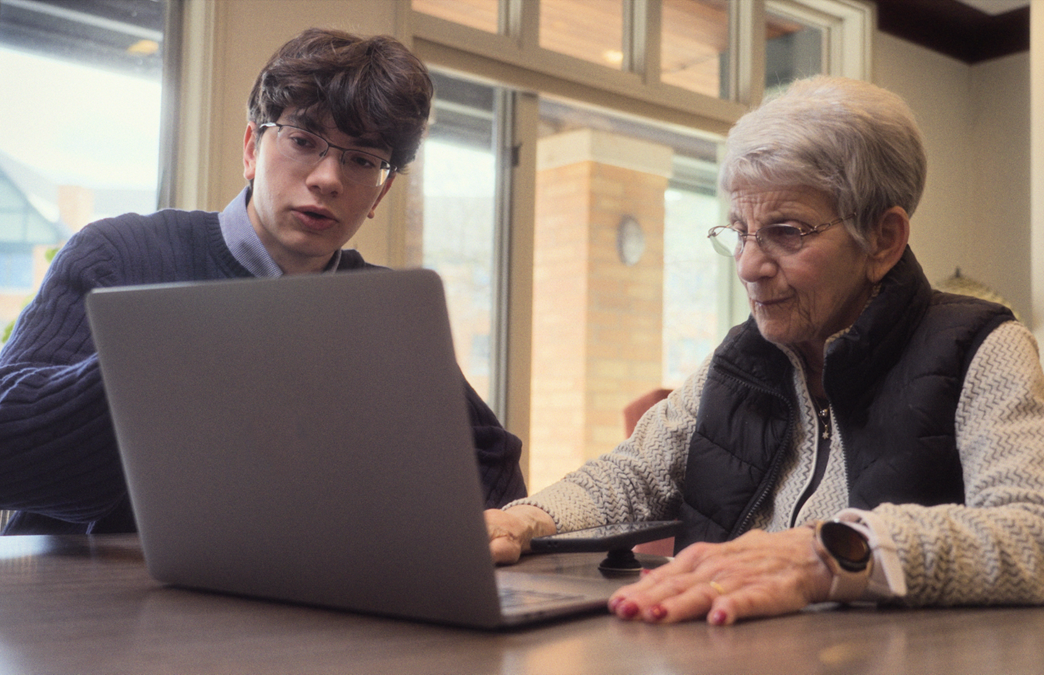The growing menu of digital technologies available to help older adults age in place, stay in touch with loved ones, retain cognitive skills, or enjoy continuous learning is a blessing due to increasing choices—and a challenge because of its never-ending learning curve.
Knowing that its information technology staff does not have the capacity to meet all its residents’ increasing personal tech support needs, LeadingAge member Jewish Home, Rochester, NY, collaborates with a local university to operate TekHub, an innovative “one-stop shop” program launched a half-decade ago that provides technical support to residents. Students from the Rochester Institute of Technology (RIT) are TekHub’s consumer tech guides, responsible for helping residents learn about and use digital equipment—everything from mobile devices to desktop computers to smart televisions and digital thermostats and cameras. The students tackle tech challenges and troubleshoot problems for Jewish Home residents with the goal of increasing residents’ fluency with their devices, software, and social media.
Now, with five years’ experience, Jewish Home is expanding TekHub by offering its services to people aged 55 and older within a 15-mile radius of its campus. Though TekHub has been funded by Jewish Home as a no-fee amenity for residents, the off-campus community service charges clients $125 for a one-hour visit to their home (or $70 if they come to the campus), or they can buy a subscription covering up to eight visits in a year. Jewish Home’s Travis Masonis, senior vice president & chief innovation officer, said the employees are also given discretion to reduce the fees on a case-by-case basis, for instance when a client’s problem requires only a few minutes to solve.
Proving Its Value in a Time of Great Need
TekHub’s beginning was well-timed. Launched using start-up funds from the Jewish Home Foundation only a month before the March 2020 beginning of the COVID-19 pandemic, the service played a critical role in serving Jewish Home residents at a time when their need for technology, especially for communication, ramped up dramatically. Masonis said the pre-pandemic need for TekHub was clear, but as residents suddenly found themselves unable to visit with loved ones due to COVID restrictions, it became much more critical.
Even as the pandemic waned, TekHub flourished, building a large database of user issues and solutions compiled from its 3,000 service requests since 2020. The student employees, paid by Jewish Home, work one to two semesters, full-time. Noah Wallace, TekHub’s first student employee, also helped develop the initiative. Today he works for Jewish Home as a consumer tech guide, and manages TekHub on the Jewish Home campus.
There are usually two students employed at any one time, each handling six to seven calls a day. At each TekHub encounter, a dozen data points are collected,feeding the database of requests. According to Masonis, the data shows that residents’ top three technology needs are awareness and management of cybersecurity, help learning mobile devices, and managing wi-fi connections and smart devices in the home.
Though most students have been computer science majors who arrive with good technology skills, all go through a “boot camp” to familiarize themselves with the range of issues they will face, and work with Wallace to understand what it means to serve older adults’ technology needs.
Jewish Home’s relationship with RIT goes back to 2019, when students gathered data from residents to study their technology needs. Since then, the collaboration has included continuing research to better understand residents’ needs and identify barriers to technology use. For instance, RIT researchers have found that lack of awareness or education is far more likely to discourage technology use than physical limitations such as vision or hearing loss, although people who have not grown up using smart phones often need help mastering the fine motor skills required to operate them.
Because the organization has many home and community-based service (HCBS) lines, early marketing for the new TekHub service is building on the existing HCBS mailing lists and marketing channels: social media, online ads, targeted email, and paper mailings.
Masonis hopes the expansion of TekHub offers two benefits: a revenue stream to help sustain the program, and a way to raise Jewish Home’s profile: “We’ll be creating a different kind of affinity … with people who would probably never have an interaction with [Jewish Home], and it’s a good opportunity for expanding our home and community-based services [HCBS] as a whole.”
Photo, courtesy of Jewish Home: A TekHub consumer tech guide works with a Jewish Home resident.
Do you have a story of innovation to tell? Use the LeadingAge Story Collector, powered by Greystone, to tell us your best new practices in operations, technology, workforce development, service delivery, partnerships, and more. Try it now.

 Shutdown Week Three: Impact of Ongoing Closure on Affordable Housing
Shutdown Week Three: Impact of Ongoing Closure on Affordable Housing Colleagues on the Move, February 18, 2026
Colleagues on the Move, February 18, 2026


